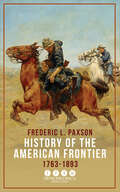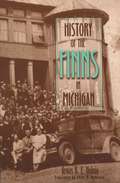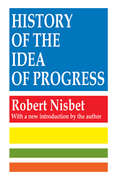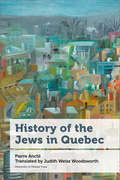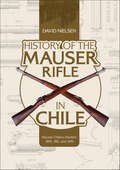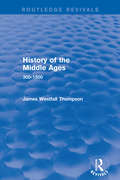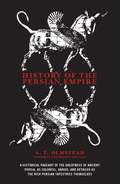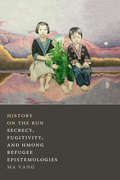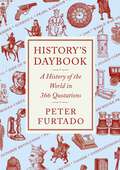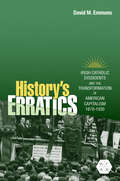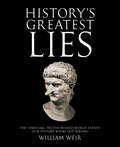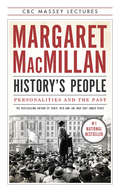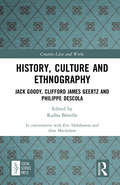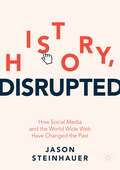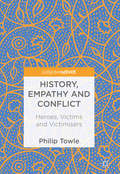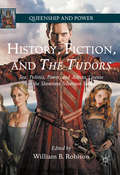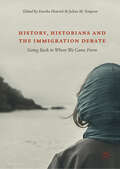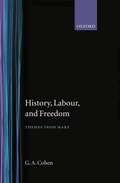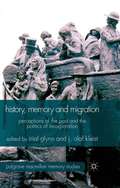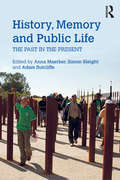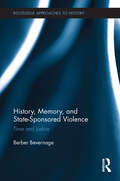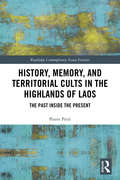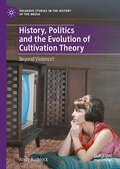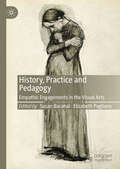- Table View
- List View
History of the American Frontier: 1763–1893
by Frederic L. PaxsonThough several historians had published works on America's westward expansion prior, Paxson's Pulitzer Prize winning study was groundbreaking in its complete and unified presentation. Beginning with a survey of the frontier at the end of the French and Indian War and proceeding to follow the frontier westward until the close of the period of settlement in about 1890, Paxson's cross-sectional method carries the narrative in a wide windrow of detail, serving as a detailed and scholarly synthesis of the fragmentary work of previous historians. An essential title for any study of American history.
History of the Finns in Michigan
by Armas K. E. Holmio Ellen M. RyynanenMichigan's Upper Peninsula was a major destination for Finns during the peak years of migration in the nineteenth century and the early decades of the twentieth century. Several Upper Peninsula communities had large Finnish populations and Finnish churches, lodges, cooperative stores, and temperance societies. Ishpeming and Hancock, especially, were important nationally as Finnish cultural centers. Originally published in Finnish in 1967 by Armas K. E. Holmio, History of the Finns in Michigan, translated into English by Ellen M. Ryynanen, brings the story of the contribution of Finnish immigrants into the mainstream of Michigan history. Holmio combines firsthand experience and personal contact with the first generation of Finnish immigrants with research in Finnish-language sources to create an important and compelling story of an immigrant group and its role in the development of Michigan.
History of the Idea of Progress
by Robert NisbetThe idea of progress from the Enlightenment to postmodernism is still very much with us. In intellectual discourse, journals, popular magazines, and radio and talk shows, the debate between those who are "progressivists" and those who are "declinists" is as spirited as it was in the late seventeenth century. In History of the Idea of Progress, Robert Nisbet traces the idea of progress from its origins in Greek, Roman, and medieval civilizations to modern times. It is a masterful frame of reference for understanding the present world.Nisbet asserts there are two fundamental building blocks necessary to Western doctrines of human advancement: the idea of growth, and the idea of necessity. He sees Christianity as a key element in both secular and spiritual evolution, for it conveys all the ingredients of the modern idea of progress: the advancement of the human race in time, a single time frame for all the peoples and epochs of the past and present, the conception of time as linear, and the envisagement of the future as having a Utopian end.In his new introduction, Nisbet shows why the idea of progress remains of critical importance to studies of social evolution and natural history. He provides a contemporary basis for many disciplines, including sociology, economics, philosophy, religion, politics, and science. History of the Idea of Progress continues to be a major resource for scholars in all these areas.
History of the Jews in Quebec (Canadian Studies)
by Pierre AnctilThe presence of Jews in Quebec dates back four centuries. Quebec Jewry, in Montreal in particular, has evolved over time, thanks to successive waves of migration from different regions of the world. The Jews of Quebec belong to a unique society in North America, which they have worked to fashion. The dedication with which they have defended their rights and their extensive achievements in multiple sectors of activity have helped foster diversity in Quebec. This work recounts the different contributions Jews have made over the years, along with the cultural context that encouraged the emergence in Montreal of a Jewish community like no other in North America. This is the first overview of a history that began during the French Regime and continued, through many twists and turns, up to the turn of the twenty-first century.
History of the Mauser Rifle in Chile: Mauser Chileno Modelo 1895, 1912, and 1935
by David NielsenThe acquisition history and the technical specifics of the Mauser rifles and carbines sold to Chile from 1895 to 1935
History of the Middle Ages: 300-1500
by James Westfall ThompsonFirst published in 1931, this book covers the broad period of time between the Christian Roman Empire instituted in the fourth century and the period of the Renaissance. The author traces the main events of medieval history — striking a balance between political, institutional, social and cultural history — with no event of major importance escaping recognition. In addition to covering medieval Europe in detail, it also includes sections on the Byzantine Empire and the foundation of Islam. Many maps are also included to geographically illustrate key points. This book will be of interest to students of history.
History of the Persian Empire
by A. T. OlmsteadOut of a lifetime of study of the ancient Near East, Professor Olmstead has gathered previously unknown material into the story of the life, times, and thought of the Persians, told for the first time from the Persian rather than the traditional Greek point of view. "The fullest and most reliable presentation of the history of the Persian Empire in existence."—M. Rostovtzeff
History of the United States, Volume 2: Civil War to the Present
by Christian G. Appy Lorna C. Mason Thomas V. DiBaccoHistory of the United States, Volume 2: Civil War to the Present
History on the Run: Secrecy, Fugitivity, and Hmong Refugee Epistemologies
by Ma VangDuring its secret war in Laos (1961–1975), the United States recruited proxy soldiers among the Hmong people. Following the war, many of these Hmong soldiers migrated to the United States with refugee status. In History on the Run Ma Vang examines the experiences of Hmong refugees in the United States to theorize refugee histories and secrecy, in particular those of the Hmong. Vang conceptualizes these histories as fugitive histories, as they move and are carried by people who move. Charting the incomplete archives of the war made secret through redacted US state documents, ethnography, film, and literature, Vang shows how Hmong refugees tell their stories in ways that exist separately from narratives of U.S. empire and that cannot be traditionally archived. In so doing, Vang outlines a methodology for writing histories that foreground refugee epistemologies despite systematic attempts to silence those histories.
History's Daybook: A History of the World in 366 Quotations
by Peter FurtadoEvery day of the year carries the memory of great and terrible events. From the founding of Rome to the 21st century's war on terror, History's Daybook presents a vivid, day-by-day perspective on 2,500 years of human history through the medium of 366 quotations, each of which is tied to the anniversary of a celebrated historical event, capturing its essence with the immediacy of the eye-witness or the narrative flair of the chronicler. In History's Daybook, every day becomes a window on the past: on March 15, 44 BC, blood flows in the Roman Senate as Julius Caesar falls victim to the thrusting daggers of Brutus and his co-conspirators; May 1, 1851 brings a visit to London's Great Exhibition in the company of the novelist Charlotte Brontë; on June 28, 1919, in the Hall of Mirrors of the Palace of Versailles, brokenspirited, German delegates sign the Treaty that brings the Great War to its fateful conclusion; on August 16, 1665, we walk the silent streets of plague-ravaged London with the diarist Samuel Pepys; and on September 11, 2001 we watch in horror as the Twin Towers topple and the world changes forever. History's Daybook embraces a wide range of voices, moods, and registers, from the powerful to the impoverished, the revolutionary to the reactionary, the propagandist to the idealist, and the joyful to the grief-stricken. Both engrossing anthology and informative overview of world history, History's Daybook offers the reader entertainment and instruction in equal measure: it is the ideal gift book for the history buff.
History's Erratics: Irish Catholic Dissidents and the Transformation of American Capitalism, 1870-1930 (Working Class in American History)
by David M. EmmonsAs Ice Age glaciers left behind erratics, so the external forces of history tumbled the Irish into America. Existing both out of time and out of space, a diverse range of these Roman-Catholic immigrants saw their new country in a much different way than did the Protestants who settled and claimed it. These erratics chose backward looking tradition and independence over assimilation and embraced a quintessentially Irish form of subversiveness that arose from their culture, faith, and working-class outlook. David M. Emmons draws on decades of research and thought to plumb the mismatch of values between Protestant Americans hostile to Roman Catholicism and the Catholic Irish strangers among them. Joining ethnicity and faith to social class, Emmons explores the unique form of dissidence that arose when Catholic Irish workers and their sympathizers rejected the beliefs and symbols of American capitalism. A vibrant and original tour de force, History’s Erratics explores the ancestral roots of Irish nonconformity and defiance in America.
History's Greatest Lies: The Startling Truths Behind World Events Our History Books Got Wrong
by William WeirGet the real facts you weren’t taught in school and learn how these myths have survived for so long.Discover the stories behind history’s greatest lies and how—and why—the world’s biggest whoppers have survived textbooks and lesson plans for years. For instance, did you know the conquistador Hernán Cortés wasn’t as bloodthirsty as they say? Neither were the Goths, who were actually the most progressive of the Germanic tribes. Or, that a petty criminal with a resemblance to John Dillinger was probably assassinated instead of the notorious bank robber?In History’s Greatest Lies, Weir sets the record straight through a fascinating examination of historical lies and myths and the true stories behind them. Each chapter pinpoints a misconception held as common truth in history.For example:Emperor Nero did not fiddle as Rome burnedPaul Revere had plenty of help in his midnight rideIn terms of prisons, the Bastille wasn’t all that badWeir explains why each lie persevered in our minds through ulterior motives, responsibility shirking, or exaggerations. You’ll also discover the common threads that make up these falsehoods: the scapegoats, the spin needed to cast undeserving in a better light, and the frightful oversimplification of facts.Praise for History’s Greatest Lies“Weir takes no prisoners—and tells no lies—in his continuously surprising and always fascinating new book. Great falsehoods have shaped history even more than great truths; the enduring fascination of this highly original volume is discovering how much of what we accept for fact is just plain wrong.” —Joe Cummins, author of The War Chronicles: From Chariots to Flintlocks and History’s Greatest Untold Stories
History's People: Personalities and the Past (The CBC Massey Lectures)
by Margaret MacMillanPart of the CBC Massey Lectures Series In History’s People internationally acclaimed historian Margaret MacMillan gives her own personal selection of figures of the past, women and men, some famous and some little-known, who stand out for her. Some have changed the course of history and even directed the currents of their times. Others are memorable for being risk-takers, adventurers, or observers. She looks at the concept of leadership through Bismarck and the unification of Germany; William Lyon MacKenzie King and the preservation of the Canadian Federation; Franklin Delano Roosevelt and the bringing of a unified United States into the Second World War. She also notes how leaders can make huge and often destructive mistakes, as in the cases of Hitler, Stalin, and Thatcher. Richard Nixon and Samuel de Champlain are examples of daring risk-takers who stubbornly went their own ways, often in defiance of their own societies. Then there are the dreamers, explorers, and adventurers, individuals like Fanny Parkes and Elizabeth Simcoe who manage to defy or ignore the constraints of their own societies. Finally, there are the observers, such as Babur, the first Mughal emperor of India, and Victor Klemperer, a Holocaust survivor, who kept the notes and diaries that bring the past to life. History’s People is about the important and complex relationship between biography and history, individuals and their times.
History, Culture and Ethnography: Jack Goody, Clifford James Geertz and Phillippe Descola (Creative Lives and Works)
by Eric Hobsbawm Alan MacfarlaneHistory, Culture and Ethnography: Jack Goody, Clifford Geertz and Philippe Descola is a collection of interviews that is being published as a book for the first time. These interviews have been conducted by one of England’s leading social anthropologists and historians, Professor Alan Macfarlane. Filmed over a period of several years, the three conversations in this volume are part of the series Creative Lives and Works. These transcriptions form a part of a larger set of interviews that cut across various disciplines, from the social sciences and the sciences to the performing and visual arts. The current volume is on three of the world’s most eminent social and cultural anthropologists. These conversations focus primarily on fieldwork experience in Ghana, Indonesia and Amazonia and how new dimensions and interpretations were added to the discipline of sociology and social anthropology. While Jack Goody and Clifford Geertz gave a new turn and depth to the disciple through their experiences in West Africa and Indonesia, Philippe Descola, who belongs to the succeeding generation of anthropologists, added human-nature interactions into the mix. This book talks about both overcoming and understanding the importance of taking into account linguistic, historical, economic and cultural elements in the study of these societies through engaging conversations and occasional anecdotes. Immensely riveting as conversations, this collection gives one a flavour of the many different societies and cultures in far-flung reaches of the world encompassing several continents, often with no knowledge of each other’s existence, and a taste of how expansive the discipline of sociology and social anthropology are. The book will be of enormous value not just to those interested in the fields of Sociology, Social Anthropology and Ethnography, but also those with an interest in History, Philosophy, Comparative Religion and Cultural Studies. Please note: This title is co-published with Social Science Press, New Delhi. Taylor & Francis does not sell or distribute the Hardback in India, Pakistan, Nepal, Bhutan, Bangladesh and Sri Lanka.
History, Disrupted: How Social Media and the World Wide Web Have Changed the Past
by Jason SteinhauerThe Internet has changed the past. Social media, Wikipedia, mobile networks, and the viral and visual nature of the Web have inundated the public sphere with historical information and misinformation, changing what we know about our history and History as a discipline. This is the first book to chronicle how and why it matters. Why does History matter at all? What role do history and the past play in our democracy? Our economy? Our understanding of ourselves? How do questions of history intersect with today’s most pressing debates about technology; the role of the media; journalism; tribalism; education; identity politics; the future of government, civilization, and the planet? At the start of a new decade, in the midst of growing political division around the world, this information is critical to an engaged citizenry. As we collectively grapple with the effects of technology and its capacity to destabilize our societies, scholars, educators and the general public should be aware of how the Web and social media shape what we know about ourselves - and crucially, about our past.
History, Empathy and Conflict: Heroes, Victims And Victimisers
by Philip TowleThis book argues that popular culture has been transformed in a silent revolution from emphasising history’s heroes to its victims. While city squares and stations were named in the nineteenth century after military victories, now the equivalent airports are named after the victims of violence. Where war reports used to focus on the leadership of the generals and the bravery of the troops, now they are mostly about casualties, refugees and destruction. History, Empathy and Conflict examines the diplomatic consequences of such a revolution in sensibility. Many governments have responded by apologising for their country’s historic actions. History teaching in schools has sometimes been revised to reflect the new emphasis and to build confidence between nations and respect for domestic minorities. Not least of the reasons for these changes is the difficulty or impossibility of making restitution for past wrongs. But history can also be used by the media and governments to justify intervention to protect victims of civil wars only to come to be seen as victimisers themselves. The past is always difficult to interpret but is the basis of all our decisions and all institutions try to twist it to their own convenience. Sympathy with history’s victims is a great moral advance but it can be used by dissatisfied nations to justify their revisionist policies and with the election of President Trump in 2016, all the Great Powers claim to be history’s victims.
History, Fiction, and The Tudors: Sex, Politics, Power, and Artistic License in the Showtime Television Series (Queenship and Power)
by William B. RobisonThis is the first book-length study of the award-winning historical drama The Tudors. In this volume twenty distinguished scholars separate documented history, plausible invention, and outright fantasy in a lively series of scholarly, but accessible and engaging essays. The contributors explore topics including Henry VIII, Catherine of Aragon, Anne Boleyn, his other wives and family, gender and sex, kingship, the court, religion, and entertainments.
History, Historians and the Immigration Debate: Going Back to Where We Came From
by Julian M. Simpson Eureka HenrichThis book is a response to the binary thinking and misuse of history that characterize contemporary immigration debates. Subverting the traditional injunction directed at migrants to ‘go back to where they came from’, it highlights the importance of the past to contemporary discussions around migration. It argues that historians have a significant contribution to make in this respect and shows how this can be done with chapters from scholars in, Asia, Europe, Australasia and North America. Through their work on global, transnational and national histories of migration, an alternative view emerges – one that complicates our understanding of 21st-century migration and reasserts movement as a central dimension of the human condition. History, Historians and the Immigration Debate makes the case for historians to assert themselves more confidently as expert commentators, offering a reflection on how we write migration history today and the forms it might take in the future.
History, Labour, and Freedom: Themes From Marx
by G. A. CohenTaking Karl Marx's theory of history as their point of departure, these essays, extensively revised and rewritten for this volume, chronicle the growth of humanity's power to produce, and the suffering that the byproducts of this freedom--exploitation, lack of freedom, indignity--have caused. Cohen begins with a discussion and defense of historical materialism before expressing his own reservations about the theory, arguing that the truth of historical materialism is far more open than many Marxists believe. He then addresses some of the principal difficulties under which workers labor in contemporary capitalist class society, offering important new insights for all students of politics, political theory, and Marxism.
History, Memory and Migration
by Irial Glynn J. Olaf KleistAs the growing diversity of societies is recognised as both an asset and a challenge, academia has been forced to re-evaluate some of its basic assumptions about migrant incorporation and social memories. However, scholars have rarely combined Migration Studies and Memory Studies to consider how perceptions of the past affect the incorporation of immigrants in their host societies. The authors in this volume merge the extensive knowledge and relevant findings produced in both fields. They demonstrate, through a series of empirical studies from Europe, North America, Australia, Asia and the Middle East, how various actors have referenced diverse conceptions of their local, regional and national pasts to include and exclude immigrants from receiving societies. By focusing on how the presentation of a certain past relates to the immigration present, the book aims to examine the relationship between the politics of memory and the incorporation of immigrants.
History, Memory and Public Life: The Past in the Present
by Adam Sutcliffe Anna Maerker Simon SleightHistory, Memory and Public Life introduces readers to key themes in the study of historical memory and its significance by considering the role of historical expertise and understanding in contemporary public reflection on the past. Divided into two parts, the book addresses both the theoretical and applied aspects of historical memory studies. ‘Approaches to history and memory‘ introduces key methodological and theoretical issues within the field, such as postcolonialism, sites of memory, myths of national origins, and questions raised by memorialisation and museum presentation. ‘Difficult pasts‘ looks at history and memory in practice through a range of case studies on contested, complex or traumatic memories, including the Northern Ireland Troubles, post-apartheid South Africa and the Holocaust. Examining the intersection between history and memory from a wide range of perspectives, and supported by guidance on further reading and online resources, this book is ideal for students of history as well as those working within the broad interdisciplinary field of memory studies.
History, Memory, and State-Sponsored Violence: Time and Justice (Routledge Approaches to History)
by Berber BevernageModern historiography embraces the notion that time is irreversible, implying that the past should be imagined as something ‘absent’ or ‘distant.’ Victims of historical injustice, however, in contrast, often claim that the past got ‘stuck’ in the present and that it retains a haunting presence. History, Memory, and State-Sponsored Violence is centered around the provocative thesis that the way one deals with historical injustice and the ethics of history is strongly dependent on the way one conceives of historical time; that the concept of time traditionally used by historians is structurally more compatible with the perpetrators’ than the victims’ point of view. Demonstrating that the claim of victims about the continuing presence of the past should be taken seriously, instead of being treated as merely metaphorical, Berber Bevernage argues that a genuine understanding of the ‘irrevocable’ past demands a radical break with modern historical discourse and the concept of time. By embedding a profound philosophical reflection on the themes of historical time and historical discourse in a concrete series of case studies, this project transcends the traditional divide between ‘empirical’ historiography on the one hand and the so called ‘theoretical’ approaches to history on the other. It also breaks with the conventional ‘analytical’ philosophy of history that has been dominant during the last decades, raising a series of long-neglected ‘big questions’ about the historical condition – questions about historical time, the unity of history, and the ontological status of present and past –programmatically pleading for a new historical ethics.
History, Memory, and Territorial Cults in the Highlands of Laos: The Past Inside the Present (Routledge Contemporary Asian Societies)
by Pierre PetitThis book captures the dynamics of history, memory, and territorial cults in Houay Yong, a Tai Vat village situated in the multiethnic highland frontier between Laos and Vietnam. By taking seriously the experiences of the villagers, it partakes in a broader movement to reintegrate highlanders and their agency into history at large. Based on comprehensive fieldwork research and the examination of colonial archives, this book makes accessible, for an English-speaking audience, untapped French archives on Laos and early publications on territorial cults written by French ethnologists. In so doing, it provides a balanced perspective, drawing from the fields of memory studies and classical historical research. Following a chronological approach stretching from the nineteenth century to the present, it extends narrative analysis through a comparative ethnography of territorial cults, a key component of the performative and material presentification of the past. Highly interdisciplinary in nature, History, Memory and Territorial Cults in the Highlands of Laos will be useful to students and scholars of anthropology, history, and religious studies, as well as Asian culture and society.
History, Politics and the Evolution of Cultivation Theory: Beyond Violence? (Palgrave Studies in the History of the Media)
by Andy RuddockThis book provides a cultural history of cultivation theory, a North American mass communication paradigm best known for arguing that television violence was a potent agent of political socialisation. Decades after its inception, cultivation theory remains an evocative force in imagining twenty-first-century media power. This book reveals how many factors shaped the theory: the spectre of twentieth-century fascism, the Cold War, political turbulence in 1960s America, and the realisation that television had profoundly altered the rhythms of social and political life. The book also explains how cultivation theory became a means of analysing diverse media influences, thanks to various scholars who brought different motivations, perspectives and skills to the project. Cultivation theory succeeded because its practitioners related their work to the changing political moods of post-war America. In doing so, they created a unique critical perspective within mass communication research, which continues to shed light on the role media play in political conflict.
History, Practice and Pedagogy: Empathic Engagements in the Visual Arts
by Susan Barahal Elizabeth PuglianoThis edited volume explores the historical, practical and pedagogical possibilities for expressing and cultivating empathy through works of art. While aspects of what we today recognize as empathy has nestled in the artistic experiences and philosophies of all ages, the subjective and elusive nature of empathic responses has often resulted in the relegation of empathy to the margins of art historical inquiry. Moving into the second quarter of the twenty-first century, amidst global health crises, civic unrest, political turmoil, and persistent social inequities and injustices, this capacity to feel with and as someone or something outside of ourselves is more critical than ever. Probing the very notion of empathy, contributions address themes ranging from environmental and social justice to identity and inclusion to transdisciplinary pedagogies and practices, each with a critical eye to how works of art not only appeal to empathic sensibilities, but might play an active role in developing capacities for empathy in viewers.
